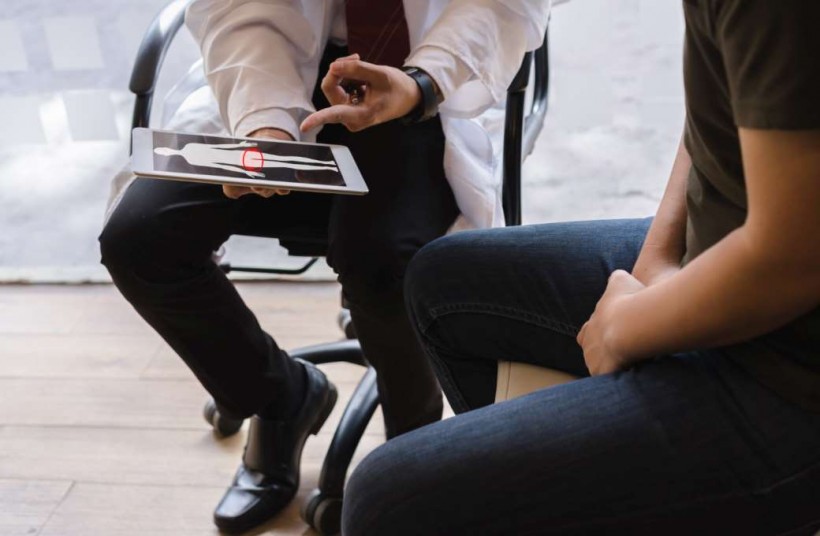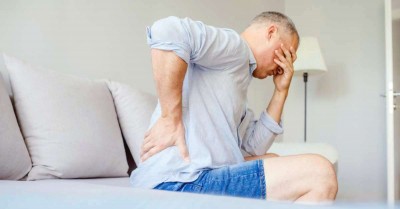Prostate Problems: 5 Things You Should Know
Warning: Undefined variable $post in /home/dietofli/public_html/wp-content/plugins/code-snippets/php/snippet-ops.php(584) : eval()'d code on line 3
Warning: Attempt to read property "ID" on null in /home/dietofli/public_html/wp-content/plugins/code-snippets/php/snippet-ops.php(584) : eval()'d code on line 3
The estimated reading time is 6 minutes
Warning: Undefined variable $post in /home/dietofli/public_html/wp-content/plugins/oxygen/component-framework/components/classes/code-block.class.php(115) : eval()'d code on line 3
Warning: Attempt to read property "ID" on null in /home/dietofli/public_html/wp-content/plugins/oxygen/component-framework/components/classes/code-block.class.php(115) : eval()'d code on line 3

All men are vulnerable to prostate problems. The three most classic types of prostate diseases are an enlarged prostate, prostatitis, and prostate cancer. Prostate cancer is one of the most prevalent carcinomas globally, with over 1,400,000 new cases annually.
The problem is many prostate issues go unnoticed. Some men don’t feel the need to seek treatment. Or they put off a prostate exam either because they are afraid of having one or think they are not old enough to get it.
Here, you can get some valuable insight into the most well-known prostate problems and figure out the right time to get checked or receive treatment.
5 Things Men Should Know About Prostate Problems
The prostate gland changes with age. It can grow so large that it can start squeezing the urethra, making it difficult to urinate. Some patients in their 30s or 40s start having urinary symptoms. Others develop them later in life.
According to research, the overall prostatic growth increases with age and reaches its peak between the ages of 56 and 65. Then it declines quickly after. But, there is more to the prostate than meets the eye. And men can experience different prostate problems.
1. Early Warning Signs of Prostate Problems
Prostate complications can vary. Prostatitis, swelling or inflammation of the prostate gland, can affect patients of all ages. But, it is commonly found in individuals younger than 50. Benign prostatic hyperplasia (BPH) is typically recorded in patients over 50.
The first signs of prostate problems can include:
- Frequent need to pee
- Urge to pee but little comes out
- Burning sensations when urinating
- Blood in semen or urine
- Waking up many times in the middle of the night to pee
- Painful ejaculation
- Loss of bladder control
- Frequent stiffness or pain in the upper thighs, rectum, pelvic floor, hips, or lower back
Don’t know how to recognize prostate pain? When the prostate hurts, the pain is usually centered in the groin, lower abdomen, or lower back. It can be mild or severe, depending on what’s causing the problem. The pain can also lead to some form of sexual dysfunction.
See a urologist if you spot any of these symptoms of prostate disorders or unusual changes in the pattern of urination.
- Tip: Men or patients assigned male at birth should consider getting a prostate exam by the time they turn 50. If anyone in the family has a history of prostate carcinoma, patients should get a prostate exam when they turn 45.
2. Foods Can Irritate the Prostate
Very few people think about the impact their food is having on their prostate. To ease prostate irritation, it is important to steer clear of acidic, spicy, hot, and high potassium foods.
One of the most prevalent irritants is caffeine, which can increase urethral and bladder irritation. Studies show that habitual eating of foods high in saturated fat, calcium, and well-done meats could increase the likelihood of advanced prostate carcinoma.
The sweeter the baked goods, the bigger the odds of them containing saturated fat. This can be a problem for prostate health. So, you might want to reduce the intake of sweet baked products and other options that can affect the prostate.
3. Not All Treatments Involve Surgery
Surgery is often done to treat localized prostate carcinoma. It could be used alone or alongside chemo, hormone, or radiation therapy. But, not all prostate disorders require surgical treatment. Depending on what’s causing the problem, men can use medication, active surveillance, or minimally invasive therapies.
Prostatitis treatment, for example, can involve antibiotic therapy, alpha-blockers, painkillers, or laxatives. Treating BPH relies on lifestyle changes, medicine, catheters, and other procedures. A doctor can suggest the best course of action that can mitigate prostate symptoms.
This may include consuming fewer artificial sweeteners, fizzy drinks, caffeine, and alcohol. Medicines like anticholinergics, alpha-blockers, and diuretics can also help.
On another note, many men like to try acupuncture, herbal treatments, or homeopathy to manage urinary tract dysfunction. Saw palmetto is one of the most popular complementary treatments of choice.
The benefits of saw palmetto, such as improving prostate health, curbing inflammation, and enhancing urinary tract function, make it a potential therapeutic remedy for BPH. If you plan on treating prostatitis naturally, BPH, or any prostate problem, talk to a specialist first.
4. You Can Live Without a Prostate
To treat localized prostate cancer, the entire prostate gland can be removed. Luckily, the prostate is not necessary for survival. But, it is a vital component in reproduction and fertility. After removing it, men can no longer produce or ejaculate semen.
However, men can still enjoy sex, even without a prostate. They might achieve that through manual, oral, or mental stimulation. After prostate removal, the testicles will keep making sperm cells. These cells end up getting reabsorbed back into the body. This leads to having a “dry orgasm.”
5. Medication Side Effects Can Affect the Prostate
Some medications can worsen the symptoms of a swollen or enlarged prostate. These include diuretics, antidepressants, and over-the-counter drugs like decongestants and antihistamines. Also, the medicines you use to treat the prostate can cause side effects.
Flomax (Tamsulosin) is often used for BPH and chronic prostatitis. The potential side effects of Flomax sexually include reduced libido, ejaculation problems, decreased erectile function, drop in sexual function, and priapism.
Abruptly stopping the medication is not good either. The Flomax side effects after stopping could make your condition worse, as the symptoms might return. So, it is best to consult with a doctor about your medications and stick to their instructions.
Conclusion
The prostate goes through a big ordeal with age. Some of the conditions men can face include prostatitis, BPH, and prostate carcinoma. As soon as you notice urinary dysfunction or any uncomfortable symptoms, it is best to get the prostate checked. Symptoms such as frequent urination and painful ejaculation could be a tell-tale sign that something is wrong with the prostate. With on-time treatment, you can manage the symptoms and treat the underlying health problem.
Author Bio
Ben’s Natural Health is the world’s first high-quality, all-natural, scientifically proven clinical supplement company. Their motto is to combine holistic healing with modern science.
Ben has brought together a team of naturopaths, nutritionists, and medical researchers to help him create real, side-effect-free solutions to serious metabolic health conditions.
References
- https://www.ncbi.nlm.nih.gov/books/NBK571326/
- https://www.ncbi.nlm.nih.gov/pmc/articles/PMC3739117/
- https://www.niddk.nih.gov/health-information/urologic-diseases/prostate-problems
- https://www.nia.nih.gov/health/prostate-problems
- https://www.ncbi.nlm.nih.gov/books/NBK549918/
- https://www.ncbi.nlm.nih.gov/pmc/articles/PMC4091618/
- https://www.ncbi.nlm.nih.gov/pmc/articles/PMC6995310/
- https://www.ncbi.nlm.nih.gov/pmc/articles/PMC6718136/
- https://www.ncbi.nlm.nih.gov/pmc/articles/PMC4002402/
- https://www.ncbi.nlm.nih.gov/pmc/articles/PMC5422692/














